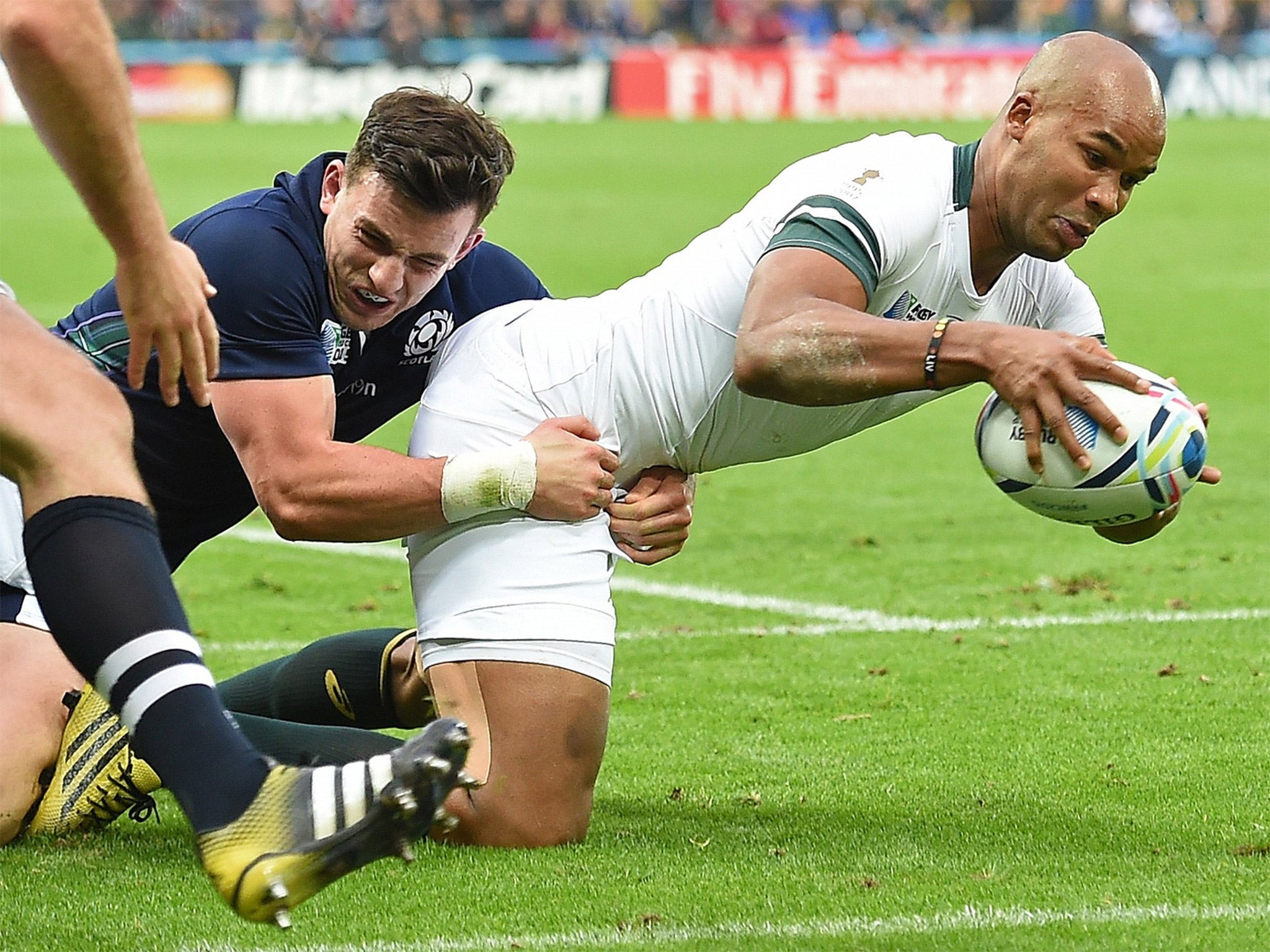RWC 2015: Japan defeat has helped galvanise South Africa for Wales examination
The Springboks' chances of winning a third global title are no worse now than they were at the start of the tournament, thanks to decisive victories in all three subsequent pool contests

It is most unlikely that Heyneke Meyer really considered ending it all – his life, that is, not his sporting career – in the aftermath of the Springboks’ jaw-dropping World Cup defeat by Japan on the opening weekend of this World Cup.
Neither is it entirely true that he spent the whole of the next day weeping into the sleeve of his treasured green jacket. Rugby is a serious business in South Africa, especially for the head coach of the national team, but it stops just short of being apocalyptic.
Yet Meyer’s attempt to make light of his reaction to those events in Brighton – “I cried for about 24 hours and then thought for an hour about committing suicide,” he said, before adding, for the purposes of clarification, that he was “only joking” – merely served to demonstrate precisely how numbing the experience had been. “It was,” he confessed after the laughter had died down, “a very tough moment.”
Not tough enough to knock the Boks wholly out of kilter, however. Their chances of winning a third global title are no worse now than they were at the start of the tournament, thanks to decisive victories in all three subsequent pool contests, and while no side has ever laid hands on the Webb Ellis Trophy after dropping a game at the pool stage, Meyer believes the shock treatment his side received from the Brave Blossoms has had a galvanising effect.
“It’s easy to coach when you have a brilliant side and everything clicks, everything works for you,” he said after recalling the wing J P Pietersen to his side for this weekend’s quarter-final with Wales at Twickenham; a combination that will boast three other members of the triumphant starting team in the 2007 World Cup final – another wide man in Bryan Habana, the flanker Schalk Burger and the scrum-half Fourie du Preez. “It is not in times of peace that a leader is tested, but in times of war. That’s when you see the character coming through.”
A number of the Springboks humbled by the Japanese have had recent experience of club rugby in… Japan, strange to relate. They include Du Preez, who will lead the side against Wales in the absence of the injured captain, Jean de Villiers, invalided out of the tournament at an early stage, and Victor Matfield, another survivor from 2007 who is struggling with a hamstring issue. They also include the likes of Pietersen.
“I wasn’t surprised by the way Japan played against us,” the wing said, apparently without the benefit of hindsight. “We’d analysed them and we were all prepared, but we couldn’t maintain pressure in the game. We gave away penalties and always seemed to be on the back foot, even when we were scoring.
“Playing over there opened my mind, especially in terms of running better angles and developing my rugby understanding. Theirs is a fast game, reliant on skills rather than physicality. There are a lot of New Zealanders and Australians coaching in Japan and they give you a mix of everything. They take you out of your bubble and force you to challenge yourself.”
Around half the side named for Twickenham this weekend will follow Pietersen and Du Preez to the Far East at the close of the tournament, including some of the younger Springboks – the outside-half Handre Pollard and the lock Eben Etzebeth. According to Meyer, these relative newcomers to Test rugby have put themselves at the epicentre of the South African challenge.
“I’m a big believer in having know-how in important positions,” the coach said. “But, saying that, youngsters the world over have shown that what they lose in experience, they make up for in fire and heart. With them, sometimes the big occasion doesn’t count for much. They just go and play: some of them are very strong individuals who know what they want out of life.
“And I say to them: Boris Becker was the best at 17 and won Wimbledon; Mike Tyson was a machine at 21. Look at the best generals – at Alexander the Great. He was 21 too.” Actually, the Macedonian was proclaimed king at 20, but who’s splitting hairs?
Of course, Meyer could easily lose his own crown if the Boks go under to an injury-ravaged Wales on Saturday. It is not a pressing concern, however. “If you start putting those things in your head, then you really will get eaten up,” he said. “The pack feeds off the leader and if you’re not confident in front of your players… There are always voices in the back of your mind, but you have to put them away. I just feel so fortunate, so humble and grateful to be in this position. Every single day I’m with the Springboks, I am living my passion.”
Subscribe to Independent Premium to bookmark this article
Want to bookmark your favourite articles and stories to read or reference later? Start your Independent Premium subscription today.

Join our commenting forum
Join thought-provoking conversations, follow other Independent readers and see their replies